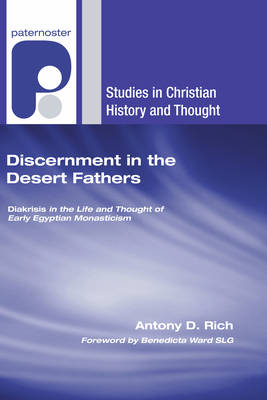
Je cadeautjes zeker op tijd in huis hebben voor de feestdagen? Kom langs in onze winkels en vind het perfecte geschenk!
- Afhalen na 1 uur in een winkel met voorraad
- Gratis thuislevering in België vanaf € 30
- Ruim aanbod met 7 miljoen producten
Je cadeautjes zeker op tijd in huis hebben voor de feestdagen? Kom langs in onze winkels en vind het perfecte geschenk!
- Afhalen na 1 uur in een winkel met voorraad
- Gratis thuislevering in België vanaf € 30
- Ruim aanbod met 7 miljoen producten
Zoeken
Omschrijving
Discernment in the Desert Fathers is a study of discernment (Diakrisis) in the life and thought of the fourth- and fifth-century Egyptian Desert Fathers. Rich argues that their understanding of Diakrisis was based upon a practical application of biblical Diakrisis in general and not, as has been argued, primarily a development of the gift of "discernment of spirits." He begins with an examination of Scripture and goes on to consider the philosophical and theological background of the period as represented by Plotinus and Origen respectively. An examination of the works of the first "theologians of the desert," Evagrius and Cassian, who lived among these first Christian monks and nuns, provides an early interpretation of the sayings of the Desert Fathers or Apophthegmata Patrum. The Greek, Latin, and Coptic sayings that survive are then examined in detail, some of them translated into English for the first time. This indepth analysis (including the comprehensive list of cross-references which will be a valuable resource for scholars researching the subject in the future) provides many insights into the lives of these early Christians and demonstrates how Diakrisis touched every aspect of their inward and outward lives. Rich concludes that Diakrisis was a critical faculty and charism central to the spiritual and practical life of these early monks and nuns in their mystical search for God, for purity of life, and knowledge of him.
Specificaties
Betrokkenen
- Auteur(s):
- Uitgeverij:
Inhoud
- Aantal bladzijden:
- 366
- Taal:
- Engels
- Reeks:
Eigenschappen
- Productcode (EAN):
- 9781498249676
- Verschijningsdatum:
- 1/04/2007
- Uitvoering:
- Hardcover
- Formaat:
- Genaaid
- Afmetingen:
- 152 mm x 229 mm
- Gewicht:
- 657 g

Alleen bij Standaard Boekhandel
+ 210 punten op je klantenkaart van Standaard Boekhandel
Beoordelingen
We publiceren alleen reviews die voldoen aan de voorwaarden voor reviews. Bekijk onze voorwaarden voor reviews.









